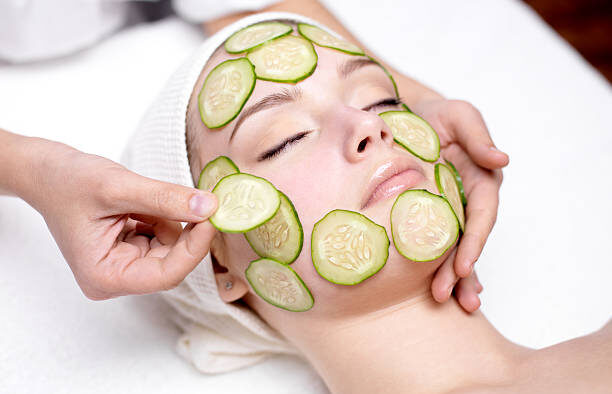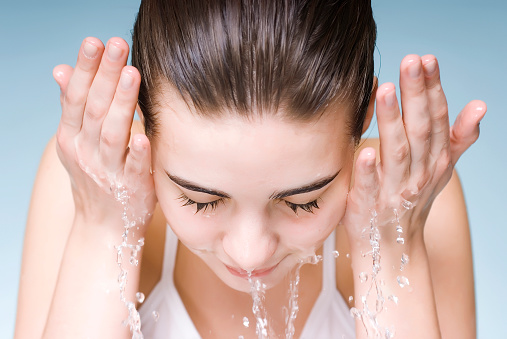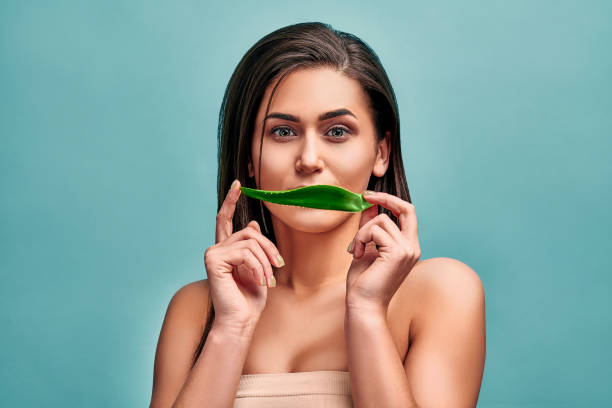The skin eats too, so start in your kitchen for your beauty routine. Āyurveda’s simple logic, unencumbered by marketing dollars to propagate its messages, looks at the biology and chemistry of the face.
Many modern consumers are convinced by the media that cosmetic products for the face are better than less intervention or homemade interventions. If companies would explain the chemistry of their products more accurately rather than cloak it under trade-secret claims, people could make more intelligent decisions. But this is the fault of today’s consumer, who is usually lazy about knowledge and lazy about making things fresh. Convenience is considered the perfect excuse for eating foods filled with preservatives and using cleansers and cosmetics that are laden with preservatives that slowly build up in the body and show damage decades later. Āyurveda’s simple logic, unencumbered by marketing dollars to propagate its messages, looks at the biology and chemistry of the face.
There are a host of natural bacteria that live all over the healthy human body, known as the microbiome. On the skin, a subset of these 900 trillion bacteria, which balance our 100 trillion human cells, take up space so that harmful bacteria cannot invade. By overusing antibacterial creams, the skin loses its capability to produce its natural antibiotics. These key chemicals communicate signals and protect us. Alcohols and astringents in face care products dry the protective layer and kill the bacteria yet make it easier for harmful bacteria to move between the cracks. When the skin is exposed to artificial creams, it loses its tone and firm connection with the underlying live skin cells, fat, nerves, muscles and connective tissue called fascia—promoting wrinkles. Āyurveda classifies all astringents as chemicals made of master elements earth and air, which are ultimately drying and increase vāta. When people dry their skin regularly, they create permanent vāta imbalances that can last a lifetime. The only temporary cosmetic solution then is to apply moisturizers. This is very convenient for the facial products industry.
Āyurveda recommends that you gently wash your face with cool water several times a day, scheduled around rituals of food, waking, entering the home, and cleaning. Rub or pat your face dry with a natural cotton cloth after rinsing. Over weeks, your face will naturally become less greasy overnight, as it stops overcompensating in anticipation of the morning’s alcohol, soap or astringent treatments. Water is naturally astringent to the level needed. If you feel very uncomfortable with the oily layer or it is grimy, learn about the following ingredients used for thousands of years to cleanse the face. Āyurvedic beauty spas use them in a host of routines for the face. Think about why these ingredients work and then choose logically for your own face.
Aloe vera, known in Sanskrit as ghritkumari, regenerates and soothes the epithelial (top skin) layer. Aloe vera contains a naturally produced antibacterial and antifungal chemical. Apply freshly harvested aloe vera gel to acne scars and drink some too. Beware of using bottled or pre-packaged aloe vera, as it is secretly laden with preservatives.
Castor oil is known as eranda and makes eyebrows and eyelashes grow thicker. Apply eranda onto eyebrows and near eyelashes at night. In the morning, remove it with some yogurt and lemon rind. A teaspoon is commonly also swallowed at night as a periodic laxative. The oil is commonly combined with other digestive herbs such as haritaki into formulations designed for vāta anulomana (sending unharmonious vāta down and out).

Rose water is very cooling and is great for inflammation on the skin, especially sunburn. It is used to treat many types of dermatitis and is excellent for rosacea. But Āyurveda emphasizes that the underlying cause of inflammation in the gut must also be addressed for long-term results. Spritz on affected areas.
Cow yogurt is an effective cleanser. It has some properties of milk, but really more properties of the alcohol and fire produced by the fermentation of the bacteria Lactobacillus. These alcohols are mildly alkaline and cause a reflex of acidification of the skin. Yogurt is generally mixed with cucumber or rose water and left on for only 10–15 minutes. It has a skin-tightening and moisturizing effect.
Cucumber has excellent cooling properties. It is great for reducing swelling and puffiness, especially under the eyes. Thin cucumber slices can be placed for 10–15 minutes on the closed eyes. A puree of cucumber can be used as a scrub. To compare with commercial products, leave your cucumber scrub from your favourite facial product line in a covered glass for three hours. If it does not look brown and squishy after this time of oxidizing, it probably contains preservatives.
Replacing your bathroom cabinet contents with oils, spices, a mortar and pestle, and some small stone bowls will change your facial skin in a few months and be an investment for life. Over several weeks of gradually diminishing use of artificial products, the skin’s natural oils and incessant desire to rejuvenate come forth. Most people notice the natural, healthy glow.







